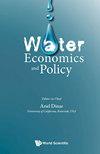How Will Climate Change Affect Residential Water Demand? Evidence from Hawai‘i Microclimates
IF 1.3
4区 经济学
Q3 ECONOMICS
引用次数: 0
Abstract
The effect that climate change will have on water resource sustainability is gaining international interest, particularly in regions where stocks are strained due to changing climate and increasing populations. Past studies focus mainly on how water availability will be affected by climate change, with little attention paid to how consumer behavior is likely to react. How a changing climate affects water demand could be equally or more important to management solutions as its influence on water supply. In this paper, we analyze the relationship between residential water use and climate on the Hawaiian island of O‘ahu, and apply a variety of climate projections to estimate end-of-century water use. The island is serviced by only one water utility yet has a wide range of consumers and microclimates, which makes it an ideal location for studying these relationships. We find that climate is strongly associated with residential water use in a manner that is likely causal. If the association is causal, our mean estimates imply that residential demand may increase up to 36% island-wide by the end of the century, holding all else the same, depending on the climate model projection. Mean estimates, however, mask a large degree of uncertainty largely due to the wide range of projected climate outcomes. Strategies for offsetting the projected increase in demand are also considered, along with the study’s place in broader literature examining watershed management and consumer welfare.气候变化将如何影响居民用水需求?夏威夷小气候的证据
气候变化对水资源可持续性的影响正在引起国际关注,特别是在气候变化和人口增加导致水资源紧张的地区。过去的研究主要集中在水的可用性将如何受到气候变化的影响,而很少关注消费者行为可能会如何反应。对于管理解决方案来说,气候变化如何影响水需求可能与其对供水的影响同等重要。在本文中,我们分析了夏威夷奥胡岛居民用水与气候之间的关系,并应用各种气候预测来估计本世纪末的用水。该岛只有一家供水公司提供服务,但拥有广泛的消费者和小气候,这使其成为研究这些关系的理想地点。我们发现,气候与居民用水密切相关,这可能是因果关系。如果这种关联是因果关系,我们的平均估计表明,根据气候模型的预测,到本世纪末,全岛的住宅需求可能会增长36%,其他方面都保持不变。然而,平均估计数掩盖了很大程度的不确定性,这主要是由于预测的气候结果范围广泛。还考虑了抵消预计需求增长的策略,以及该研究在研究流域管理和消费者福利的更广泛文献中的地位。
本文章由计算机程序翻译,如有差异,请以英文原文为准。
求助全文
约1分钟内获得全文
求助全文

 求助内容:
求助内容: 应助结果提醒方式:
应助结果提醒方式:


